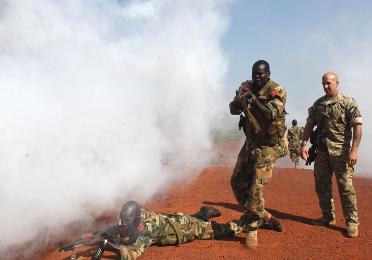Juba acknowledges US role in training security forces
December 2, 2013 (JUBA) – South Sudan has acknowledged the importance of the United States involvement in training of its army and other security organs in the country.

At least 15 South Sudan officers with support from the US completed a two-week training program on agriculture management and prison industries in June this year.
“Yes, we are thankful to the American government for all types of support we have received and continue to provide to augment the current efforts of our government”, interior minister Aleu Ayeny Aleu exclusively told Sudan Tribune on Tuesday.
The minister, a general in South Sudan army (SPLA), said the support his government receives from the US administration and its people was “immeasurably reflective of historical ties”.
“Effective government, the rule of law and sustainable economic development are all necessary for long-term stability in any country, but multiple factors continue to hinder them”, Aleu said.
Currently, they [US] are helping us transform our security forces, particularly police and the SPLA, he added.
The US administration had, in the past, affirmed its commitment to help the SPLA transform into a modernized army.
In 2011, the US Department of Defense (DOD) initiated a dialogue with South Sudan army to ensure the latter’s transition from a guerrilla force to one that can provide adequate defense capabilities for its people and territory.
Meanwhile, a senior military officer has echoed the interior minister’s view on the support South Sudan had received from the US government and it people in terms of training.
“The government of America had helped a lot in providing training to our soldiers as part of general transformation into becoming a professional army”, said the officer, who asked not to be named.
We have had training on various areas to strengthen the capability of our soldiers in all areas, he added.
The officer specifically cited the US role in the fight against the Lord’s Resistance Army (LRA), through intelligence gathering techniques used by its military experts deployed to track down the rebel activities in parts of Western Equatoria state.
“Sometimes, people do not see the importance of such training until when time comes. The training on tactical and intelligence gathering which our troops had in 2012 from US military experts is now helping them a lot in carrying out their activities as part of the regional force hunting Lord Resistance Army”, he said.
“The main objective of that training was to provide them with basic security knowledge on how to gather information and coordinate with other colleagues involved in the operation. This had helped a lot”, he added.
This year, the U.S Department of State has reportedly provided $28.9m on initiatives to strengthen law enforcement, judiciary and corrections systems in South Sudan.
SERVICE DELIVERY ON COURSE
The interior minister, on the other hand, downplayed concerns that government had failed to deliver services to its people in accordance with the ruling party (SPLM) vision of taking towns closer to the people, saying more was underway, despite the challenges.
“It is unfair to say nothing had changed from the time we took over the affair of this country. A lot of have been done despite the challenges, but this does not mean that more efforts should not be exerted. More will be done and things will never continue to be the same. The situation will change”, he stressed.
Aleu said who claimed government had not delivered services to the people were simply opposed to the current leadership.
“We have done a lot even though the whole world knows we are a young new nation. Some countries became independent about 50 years ago [but] are still having challenges today. Our situation is even being appreciated”, said the minister.
So, whatever is being said about this country is no less a drama than that in other countries, but portrayed as if they are different, he added.
(ST)
